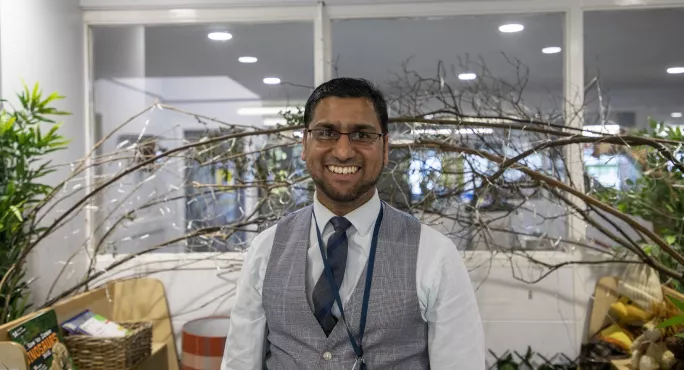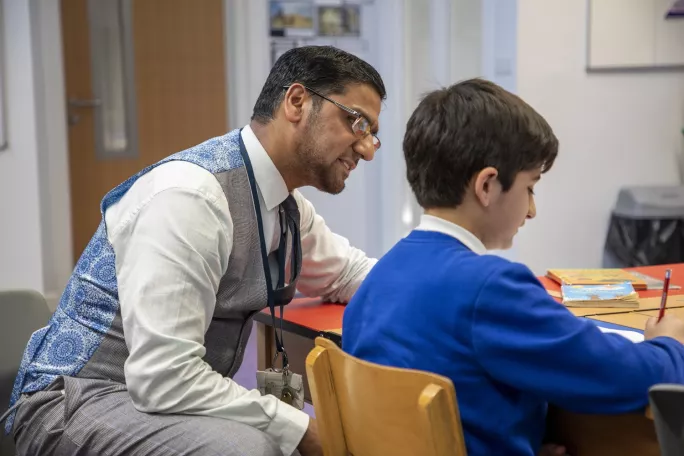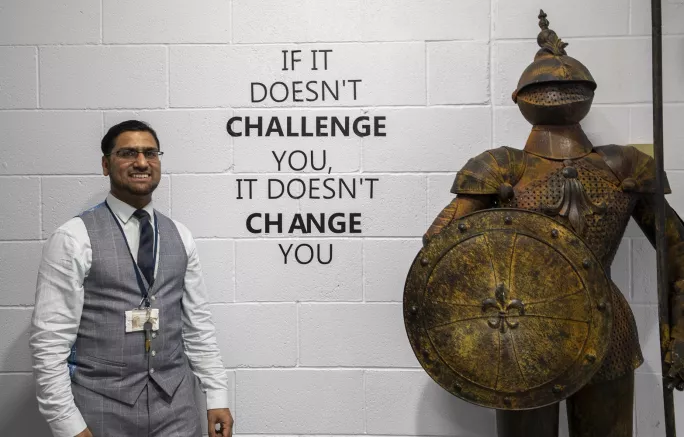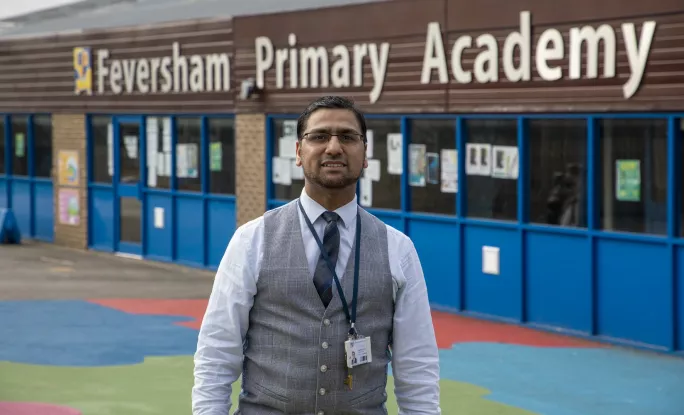- Home
- ‘Don’t worry about Ofsted - think about your pupils’
‘Don’t worry about Ofsted - think about your pupils’

Naveed Idrees has taken his inner-city primary from special measures to “outstanding” and into the top 2 per cent of schools nationally for the progress pupils make in reading and maths.
But for the Bradford headteacher, Ofsted ratings and league table rankings have never been the focus of the school’s improvement.
“The joy of learning had been completely killed here,” he tells Tes. “When I came in 2012, we were in special measures. Everybody hated learning, the teachers were just miserable and I thought: ‘Why are we just doing more of the same?’”
Award: Tes headteacher of the year
Head: How music helped us to teach British values
Quick read: How will Ofsted inspect the curriculum
Idrees decided to change things.
Now he has had the honour of being named headteacher of the year at the Tes Schools Awards 2019 for his role in Feversham Primary Academy’s remarkable turnaround.
And despite his school’s top progress scores, the focus has not solely been on English and maths but on music, arts, culture and outdoor learning.
“Ofsted and league tables are secondary,” he says. “I start with the question: ‘What does it mean to be human? What does it mean to be a child?’”
“When a school is not doing well, people might say, ‘So what should we do? Let’s do more booster sessions in English and maths. At breakfast, lunchtime, after school.’ Actually, the kids don’t need that. What the kids need is the ability to connect to something deeper inside themselves, which is where arts and culture come in.”
Idrees says this is not because he thinks maths and English are not important, but because he thinks that schools have to be able to reach children to be able to teach them.
“We shouldn’t just treat children as robots with a mind and a physical frame. Actually, they have got something deeper,” he says.
“You can call it a soul or whatever you like, but it is something that connects with something deeper. If you can connect with that and get that right, then your motivation and your passion for learning, your deeper learning, comes in.
“Our curriculum is heavily influenced by music and drama - music more so because music allows children to develop all the learning to learn skills that they need.
“It also lays the foundation for literacy and maths as well because they look at patterns, they look at sequencing, they learn the language.”
‘I like to question the perceived wisdom’
Idrees takes pride in describing his school’s approach as coming from outside the box. “I like to question the perceived wisdom about how things should be done.”
He puts this down to his route into teaching. Idrees is the first in his family to become a teacher. He went to university to get a law degree with the intention of following his elder brother into the legal profession.
After graduating, he decided to do teacher training as a way of being able to finance travelling abroad before settling down into a career as a lawyer. But things didn’t pan out that way.
“I don’t think I am actually very suited to office work,” he laughs.
It’s easy to see why.

‘There is something new every day in teaching’
“There is something new every day in teaching,” he says. “You are dealing with kids and there is so much creativity, so much variety.”
After completing his teacher training in Newcastle, he began teaching in London before returning to his home town of Halifax in West Yorkshire to teach in a primary.
From there he worked for the local council, supporting schools with pupils with special educational needs and disability, and then went on to Bradford, where he worked as a deputy head before moving to Feversham Primary for his first headship.
“My first school was Preston Park Primary in Wembley. I saw kids from all sorts of backgrounds. What I think inspired me there was that I found I had a natural ability to engage with kids.
“It was an eye opener. You had children coming from such deprived backgrounds. You realise that the only oasis of peace and hope and happiness is what you are creating in your classroom and I think I kind of got hooked. At that point, I thought: ‘Well, forget law’.”
An oasis of peace and happiness appears to be a perfect description of Feversham Primary Academy.
The interior of the school with its warm and creatively designed classrooms and learning spaces is in marked contrast to the visible poverty on the terraced streets of the BD3 postcode area of Bradford that surround it.
Idrees tells Tes that pupils’ disadvantaged backgrounds should not be seen as a factor in limiting their potential.
But he says schools do have to tailor the curriculum they develop to meet pupils’ learning needs.
“I have always worked in disadvantaged areas and what I have realised is that kids don’t have those experiences that they can connect their learning to.
“So my philosophy has always been to provide those and to have a very rich curriculum and that gives people the basis of learning. You can’t learn unless you connect to your experiences.
“If you have not had those experiences then you are only learning in a mechanical fashion. My approach has always been to enhance that so we do a lot of arts, music, drama, dance. I have got specialists in a primary school for these subjects.
“We do a lot of outdoor learning and our results are now in the top 2 per cent of the country, and for 25 years we were in a category because we were just doing the same thing.”

“Think about what is in the best interests of your kids. I think if you do that, Ofsted will be happy.”
Feversham Primary Academy’s curriculum has been shaped by subject specialists - some who balance their work with a role as classroom teachers, and others who work part time just as subject leads.
“I have the same financial footprint as anyone else,” Idrees says. “We are not doing this because we have more money. Some schools, for example, have a lot of teaching assistants, but I would rather have two fewer TAs and then employ a part-time specialist. It costs the same but I think they add greater value.
“It’s about being creative and thinking outside the box. I have never accepted the status quo.”
The school uses specialists in science, maths, music, art, drama and outdoor learning, and also employs a SEND specialist.
Idrees expands on his vision of what matters in education.
He is keen for all teachers to be thinking about and shaping the curriculum they deliver.
“The first question I ask is: ‘What does it mean to be human? What does it mean to a child?
I ask my staff: ‘What is the purpose of education?’
The second question I ask of my staff is: “What is the purpose of education?
“Are we just trying to get these kids through exams? Are we getting them ready for life? Are we preparing them for a future that is going to be very different from what we have had in the past?”
Idrees suggests that the skills his pupils will need in the future are creativity, problem solving and developing relationships.
“Everything else will be done through machine learning and AI. If our system is still just geared up to teaching them English and maths, we are failing these kids.”
He talks a lot about teaching children the skills they need when designing the curriculum. When asked if that puts the school on one side of a debate about skills versus knowledge-based curriculum, he describes this as “a false dichotomy”. His school’s curriculum is based on both.
He speaks with great urgency about the need to sequence the curriculum based on what pupils need to know in order to learn.
“Curriculum sequencing and design is very hard for teachers. So, for example, if we are talking about speed, what do the kids already know? If they don’t know what distance and time is, what is the point of teaching speed? You have to think about sequencing it.
“It’s the same with any concept. You can’t introduce a concept unless you have the basics.
“It is about the skill of analysing concepts down to their constituent parts and then sequencing the order in which children to need to learn to be able to understand.”
Idrees has worked in education since the turn of the millennium and he fears that, for much of this time, teachers have not been asked to think about the curriculum for themselves in this way.
“When I started teaching, national strategies were in their heyday and it was a very prescriptive model of teaching,” he says. “It created a cadre of teachers who just deliver a curriculum.
“They can’t design one. I call them glorified postmen if they teach but they can’t design and sequence learning to take into account the needs of the kids.
“That is something that we have focused on using specialists to support the class teachers to do.”
It is perhaps unsurprising, then, that Idrees feels Ofsted’s new focus on the curriculum is the right one.
His school was one of those visited by the watchdog when it was researching curriculum inspection while drawing up its new framework.
Ofsted going in the right direction
“Ofsted is moving in the right direction because by looking at curriculum intent, they are asking schools what it is that they think is important that their children need to learn.”
He believes this is a crucial question for schools to ask and one that each school is best placed to answer for themselves.
“I say to my teachers: ‘You are the experts on the kids in your class. You know more about them than anyone looking in from the outside’.”
Idrees says that the school encourages all its teachers, from senior leadership to NQTs, to be involved in the leadership of learning.
But he thinks more needs to be done to encourage schools to be able to make decisions based on what they think is in the best interests of their pupils.
“When Ofsted came to see us for their research, they said to us, ‘You are proof that the system works’. I thought that was very interesting.

“I said: ‘Yes and no’. The constraints of the system have not stopped us doing this. But it was a risk and the high-stakes accountability that we have does not encourage schools to do it.”
Idrees suggests a national measure of how well a school enriches its pupils could be the answer.
“We need to have some sort of curriculum or enrichment measure like we do with standards because what happens is that when something gets measured, people think it’s important.
“If we could measure this in the system nationally, it would give parents a better understanding that it is not just about exam results - it is also about what enrichment the are kids getting.
“I know there are some ‘outstanding’ schools that I wouldn’t send my kids to because they would be bored stiff. It’s not just about the results. It’s about getting kids who enjoy learning and have a passion for learning by the time they leave primary school.
“The primary years should be the most memorable part of your life. You shouldn’t just remember your Sats.”
The Tes Schools Awards 2020 are open for entry until 27 March. To find out more and enter, visit tesawards.co.uk
CV: Naveed Idrees
- Educated at Sowerby Bridge High and Crossley Heath Grammar in Halifax
- Law degree at University of Leeds
- Teacher training at Northumbria University, Newcastle
- Teacher at Preston Park Primary, Wembley, London
- Teacher at Parkinson Lane Primary, Halifax
- Inclusion assessment consultant for Calderdale Council
- Deputy head at Westbourne Primary, Bradford
- Headteacher at Feversham Primary Academy, Bradford
Keep reading for just £1 per month
You've reached your limit of free articles this month. Subscribe for £1 per month for three months and get:
- Unlimited access to all Tes magazine content
- Exclusive subscriber-only stories
- Award-winning email newsletters



